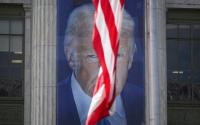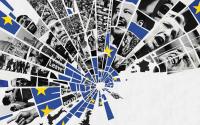14 January 2007Ted Widmer
George W. Bush's address to the nation on Wednesday night was relentlessly promoted, long before the actual speech, as a major turning point in the war on Iraq, and by extension, the Bush presidency itself. Speeches usually fail to live up to such exalted expectations, but in this case, the billing was justified -- just not in the way that the president and his advisers hoped.
The significance of the speech was not in its so-called news -- that more than 20,000 new troops are being deployed to shore up Baghdad and Anbar Province. Everyone knew what it was going to say, thanks to early teases from the White House. Throughout Wednesday, the president was aggressively spinning its reception, meeting extensively with media and congressional leaders, trying to engineer a soft landing -- all before the speech was delivered from the White House Library at 9 p.m. The reading of the remarks appeared to be an afterthought.
Yet presidential speeches are always about theater. From the moment it began, this appearance was meaningful for the strange new part played by a long familiar actor, away from his normal stage. For years, we have seen George W. Bush enfold himself in all of the trappings of the imperial presidency -- the Rose Garden, Air Force One, Camp David, and the Oval Office. From "Mission Accomplished" to the series of speeches about victory that he gave in late 2005 (with the advice of Henry Kissinger), this was a presidency of overweening confidence. No battleship was too large for a photo op; no historical allusion too grandiloquent. Of course the war on terror was as challenging as World War II, or the Cold War, or the American Revolution.
But on Wednesday night, we suddenly found ourselves in an unfamiliar setting. Why was he speaking from the White House Library, an unfamiliar place, rarely visited? The president's advisers explained that he wanted to set a different tone. He succeeded: He looked awkward, standing rather than seated, before shelves of books that do not seem like natural props for this president, in a poorly-lit environment that looks like what it is -- a room in a basement.
I remember the room well -- as a speechwriter for Bill Clinton, I used to spend hours in it, marveling at its time-warp qualities. A forlorn, seldom-visited room off a long hallway, the library is filled with books chosen by a committee (led, I recollect, by Arthur M. Schlesinger Jr.) in the heady first days of the Kennedy administration, when ideas and power were exchangeable commodities.
The books are wonderful -- old-school narratives of American history, learned sociological essays, works of fine literature -- all defined by the ancient worldview of 1961. I loved sneaking in there to read Perry Miller, or Richard Hofstadter, or F.O. Matthiessen -- astonished that such a library still existed, at the very heart of American power. (Although, given the room's location in the bowels of the White House, I'm not sure which organ to compare it to.) As far as I could tell, no one from any subsequent administration, Republican or Democrat, had seen fit to update the collection.
Having never seen anyone in the library, on any occasion, it was a shock to behold the 43d president there, especially since he had been rumored to be considering the nearby Map Room (for its echoes of FDR and the final, glorious days of World War II). It was almost as if those books -- many of which voiced a Cold War realism about the extent of America's ability to reshape the world -- were communing with him, muting his language. He sounded different, and looked it. For a second, it reminded me of President Clinton's speech -- also from the basement, but the Map Room -- admitting his involvement with Monica Lewinsky. On Wednesday, we saw an abashed president.
Bush's admission of "mistakes" may have been less than forthright, tortured by the odd syntaxes that presidents revert to when seeking to both accept and avoid blame. The passive voice, which all writing teachers tell us to avoid, becomes crucial on such occasions. Reagan confessed to Iran-contra by saying "mistakes were made"; President Bush improved on that to say "where mistakes have been made, the responsibility lies with me." But even if that was badly written, it acknowledged a vital truth that needed to be told.
Aside from its ending, which cited the Author of Liberty (a phrase from the inflated second inaugural, and also from "My Country 'Tis of Thee"), Bush's speech had little of the rhetoric we have grown to expect -- the nonsense about "victory," the predictions of democracy's spread, the evangelical language about people's hearts opening up to freedom. It focused instead on small-bore details, with small words and sentences -- the longest word of the speech may have been "Lieberman."
It also acknowledged, honestly, that we may not succeed. That was all to the good, and long overdue. But it was also a bit jarring to see the patient wandering outside the bubble that had protected him from contagion. The entire Bush presidency is now teetering on the brink of an immunological emergency.
A flurry of responses on Thursday morning indicated that the president's Iraq plan will be a tough sell before a public developing its own immunity -- to Bush. The speech will probably have no effect at all on his growing list of critics, and depress his supporters. Around 20 percent of the public favors the plan. Prominent Republicans, including Norm Coleman of Minnesota (which may have to supply the next batch of troops), Chuck Hagel of Nebraska, Gordon Smith of Oregon, and even Sam Brownback of Kansas have criticized it as well. The right-of-center columnist David Brooks faulted it for vagueness and for claiming to be the desire of the Iraqi government, which it certainly is not.
Many journalists noted that the speech essentially ignored the main recommendations of the Iraq Study Group -- especially the idea that diplomacy must accompany military force for both to be effective. It also contradicts earlier language from President Bush that a surge would undermine Iraqi independence and "suggest that we intend to stay forever."
As any speechwriter knows, speeches are chiefly meaningful for the policies they give birth to. All of us, critics and supporters alike, should acknowledge that the plan has a chance of succeeding. And we all hope fervently that it does. But it would be foolish not to have a backup plan ready, and to acknowledge, as the president did on Wednesday, that extra troops will also sustain extra casualties. That seems unlikely to increase the president's standing. For years, President Bush has repeated the mantra that "failure is not an option." Last Wednesday, it was far more than an option -- it was very nearly a certainty.
An underrated Republican president, Dwight Eisenhower, was prescient in his second inaugural: "No nation can longer be a fortress, lone and strong and safe. And any people, seeking such shelter for themselves, can now build only their own prison."
Now, the president, his speechwriters, and the people they serve all occupy this rhetorical prison. For too long we promised ourselves a "victory," a word that today seems as quaint as the books of the White House Library. By failing to imagine an alternative, we are entirely unprepared for what the future may hold.
Ted Widmer is the director of the John Carter Brown Library at Brown University. A former speechwriter for President Bill Clinton, he is the editor of the Library of America's two-volume "American Speeches."
http://www.boston.com/news/globe/ideas/articles/2007/01/14/his_hour_upon_the_stage/?page=1






